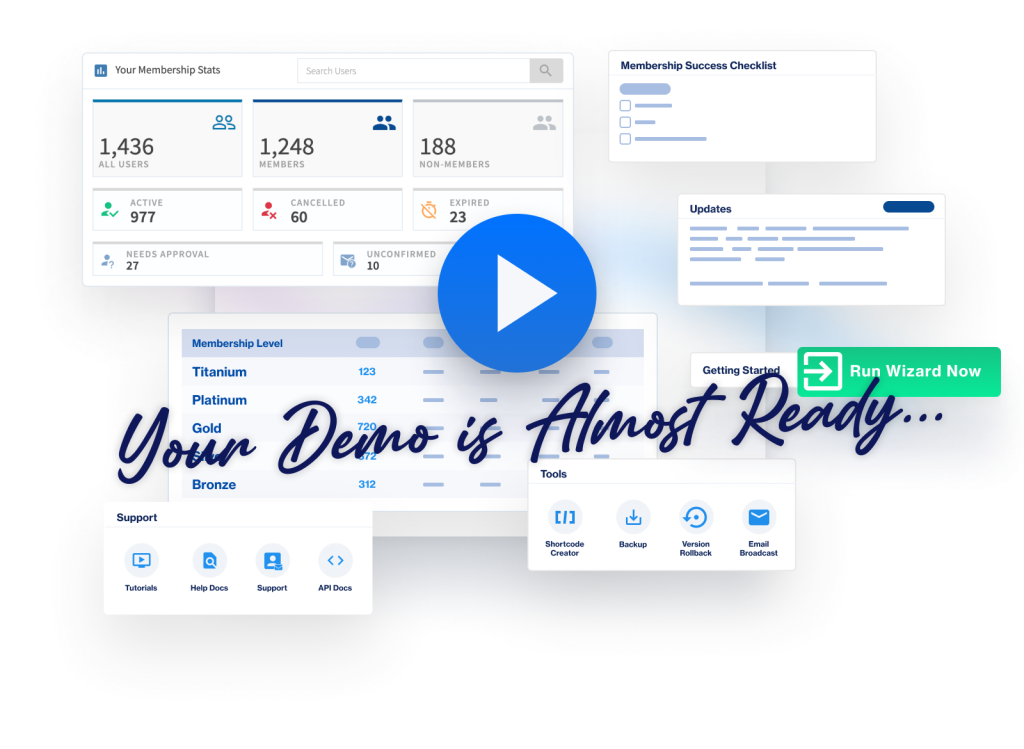Have you ever wondered how exactly a learning management system (LMS) works?
Contents
How does it,
- Track your course progress?
- Design the content in an appealing way?
- Protect the content?
- Take the payment?
On top of these, it also provides a certificate as soon as you complete an online course. Doing all these manually would have been… “Impossible,”
But that's where WordPress LMS plugins come in, making it possible to run everything smoothly.
These tools can help you effortlessly design interactive online course platforms. They can also help you accept recurring payments and manage multi-level subscriptions.
In this blog, we’ll talk in detail about WordPress LMS plugins and how you can get started with your LMS journey.
The Benefits of WordPress LMS Plugins
WordPress LMS plugins offer loads of benefits and make running an online learning platform way easier than it seems. Maybe that’s why so many people are now joining the online teaching trend.
Thanks to the LMS plugins, all the possible mammoth tasks will be simplified for you. Here are the key benefits of WordPress LMS plugins.
User-Friendly Interface: These plugins are designed to be intuitive, allowing even those with minimal technical skills to create and manage courses easily.
Customizability: Various themes and plugins allow you to customize your online learning platform to match your brand and educational needs.
Cost-Effective: WordPress LMS plugins often cost a fraction of the cost of other LMS solutions, making them affordable for small – to medium-sized educational businesses.
Scalability: WordPress LMS plugins can scale with you as your student base grows, providing the necessary tools to handle increased traffic and content.
Integration Capabilities: These plugins can integrate with various third-party tools, such as payment gateways, CRM systems, and marketing automation platforms, enhancing functionality.
Content Management: They offer robust content management systems, allowing you to organize courses, lessons, and quizzes efficiently.
Analytics and Reporting: Most plugins provide comprehensive analytics and reporting features, helping you track student progress and improve course effectiveness.
Mobile Responsiveness: Many WordPress LMS plugins are designed to be mobile-friendly, ensuring students can access courses on various devices.
Community Building: These plugins often include features for forums, discussion boards, and social sharing, fostering a sense of community among learners.
Support and Documentation: Extensive support and documentation are available, making it easier to troubleshoot issues and maximize the potential of the LMS.
Things to Consider Before Finalizing Your WordPress LMS Plugin
Since there are many options available in the WordPress LMS plugins category, you need to be thoughtful before making the final decision. While most LMS plugins are great in one way or another, you need to find the one that fits your needs.
That’s why we have done the research and compiled a list of the things you must consider to find the right plugin for you.
Features and Functionality
To run an LMS platform smoothly, you’ll need a lot of support, and by support, we mean features. The number of features your chosen plugin offers is often the determining factor for many.
Features like course creation tools, multimedia support, quizzes, and student progress tracking are necessary for any LMS platform. In this competitive market, it's impossible to stand out in the competitive LMS market. Some WordPress LMS plugins offer even more advanced features.
Think about the features you’ll need to make your dreams a reality and check which LMS offers them all. Remember to consider functionality factors like integration capabilities, scalability, and mobile responsiveness as well to create a user-friendly LMS platform.
Ease of Use
If you choose a platform that’s so difficult to navigate that it makes you wonder whether learning to code would have been easier, you are already on the wrong path.
The plugin should be easy to navigate and set up for you and for the students to go through the lessons. If users don’t find your platform easy to use, they’ll choose another platform in the blink of an eye.
So, you need to choose an LMS plugin that’ll help you build courses that make the students not blink at all. Features like easy setup, a clean, intuitive interface, and drag-and-drop course builders are a must.
Pricing and Budget
While many LMS plugins offer the facility to accommodate unlimited courses and students, some charge more as the number grows. You don’t want to end up having to pay more as your number grows.
That’s why it's very important to be wise about your budget and which plugin will be the best value for money. Select a plugin that’s comparatively cheaper but offers the features you want. Also, make sure you don’t need to pay any extra as you host more courses or take on more students.
Integration Capabilities
While your LMS plugin will offer all the features and functionalities needed to run the platform, you’ll often need more than that. How about a registration form? Or maybe contacting new users through emails?
That’s where integration facilities come into play.
Integration facilities with different payment gateways, CRM systems, email service providers, and tracking software can uplift your course marketing and tracking effort. This integration ensures a smooth workflow and enhances the functionality of your platform.
Scalability
Consider the future growth of your online learning platform. The tool you choose should be able to handle an increasing number of users and courses without compromising performance. Look for plugins known for their scalability and check user reviews or case studies demonstrating their capability to grow your business.
If your LMS plugin can’t accommodate the constant growth in numbers, you’ll have to switch to another platform. And we are not getting into the casualties that’ll come with it. So, when you finalize a plugin, consider it for a long period.
Working with the same platform will help your team members run the operational tasks smoothly.
Reviews
Looking out for reviews before finalizing the decision is helpful to ensure you are not making a wrong decision. You can check out reviews on the plugin's website, social media handles and even on some other niche websites.
While going through the reviews, check what the existing users appreciate. If the existing users already appreciate the features you need, you can be more confident in your decision.
Customer Support and Community
Good customer support is vital for resolving issues quickly and effectively. Check if the plugin offers multiple support channels like email, live chat, or forums. A strong user community can also be a valuable resource for tips, troubleshooting, and shared experiences. Ensure there is robust support and an active community to rely on when needed.
If necessary, hire experts who can use the plugin you have selected. They can customize the platform and web pages so you can solely focus on the course materials.
Security and Updates
Your LMS plugin must prioritize security to protect student data and course content. Regular updates are essential to fix bugs, enhance features, and improve security. Investigate the plugin’s update history and security measures.
Ensure the WordPress LMS plugin you are going with offers regular updates. You’ll feel more confident storing your premium content and student’s information on their storage.
4 Best WordPress LMS Plugins in 2024
Given the huge number of WordPress LMS plugins available, it might be confusing for you to select the best one as a beginner. Needless to say, keep the factors we mentioned in mind while making your decision.
Yet, to narrow down the list for you, we’ve selected 4 of the bests in business. Let’s check them out.
WishList Member
WishList Member is a powerful WordPress membership plugin designed to help you build and manage a successful online learning platform. It provides various features that make creating and maintaining your LMS easier than eating a piece of cake.
It comes with a lot of useful features that can ensure you make the most out of your online courses. To name some of the features of WishList Member:
- Create unlimited membership levels and manage them easily.
- Restrict access based on membership levels.
- Schedule the release of your course content over time.
- Supports various payment gateways like PayPal and Stripe.
- Connect with services like MailChimp, AWeber, and GetResponse.
- Detailed reports on students' activity, transactions, and content consumption.
- Easy set-up procedure that requires only a few clicks
- Points, quizzes, leaderboards and more gamification elements
- Enhance engagement with badges and certificates.
WishList Member pricing starts at $149/year for a single site license, making it an affordable option for those beginning with an LMS platform. Higher-tier plans are available for those needing more features and support.
MemberPress
MemberPress is one of the most popular WordPress membership plugins, helping thousands of membership and LMS sites grow.
It offers extensive access control, content dripping, and seamless integration with various payment gateways, making it ideal for monetizing your courses and providing a structured learning experience.
But that’s not all that makes MemberPress unique. You can:
- Define and manage detailed access rules to protect your content, creating multiple membership tiers quickly.
- Schedule the release of course content over time, ensuring learners stay engaged and progress steadily.
- Supports numerous payment gateways, including PayPal and Stripe, for streamlined transactions.
- Get comprehensive reports on memberships, transactions, and learner progress, giving you insights to improve your courses.
- Set up this LMS tool very quickly within a few clicks.
- Gamify your content to keep the users more engaged.
You can get started with MemberPress for as low as $179.50/Year. And to enjoy all the pro benefits, you’ll have to pay $499.50/Year.
MemberMouse
MemberMouse is a versatile and powerful WordPress plugin designed to help you create and manage membership sites. Using this LMS, you can protect your content, manage flexible membership levels, and integrate with other useful tools.
Here’s what this plugin has to offer:
- Easy-to-use interface for setting up and managing memberships.
- Advanced content protection to control access to your courses.
- Integration with popular payment gateways like Stripe, PayPal, and Authorize.net.
- Flexible membership options, including free, trial, and paid memberships.
- Detailed reporting to track member activity and engagement.
You can get started with MemberMouse for $399/year. But, to access more features and a larger member base, the cost can increase to $2399/year.
AccessAlly
AccessAlly is a comprehensive LMS plugin for WordPress that combines membership management, course creation, and marketing automation. In addition to these features, this LMS provides an impressive community-building feature that most LMSs lack.
To name some of the AccessAlly features:
- Create interactive and multimedia-rich courses with ease.
- Offer a variety of membership levels and subscription plans.
- Robust community features, including forums and member directories, to foster engagement and interaction.
- Seamless integration with CRM systems like Infusionsoft and ActiveCampaign.
- Advanced reporting and analytics to monitor learner progress and course effectiveness.
AccessAlly pricing starts at $99/month, with additional features and capabilities available at higher tiers.
WishList Member + Its Add-Ons = Best WordPress LMS Plugin Experience
If we must declare a winner among the WordPress LMS plugins we’ve mentioned, we’ll go with the WishList Member. And before you ask why, let’s just say that the pre-installed add-ons take this plugin ahead of the competitors.
On top of the basic features, here’s what WishList Member ad-ons bring to the table.
Badges: This feature allows your members to earn different badges based on various actions throughout the platform. These badges can be displayed on the member's account in multiple combinations, encouraging engagement and motivation.
Points: This add-on does precisely what badges do but shows numbers instead. Points can be redeemed for access to protected content and higher membership levels, promoting active participation and rewarding progress.
CourseCure Courses: This add-on acts as a magic wand to organize and make your LMS courses more easily navigable. Your members progress through courses by working through a set of modules and lessons, which can be customized and restricted to selected members, ensuring a structured learning experience.
Quizzes: This tool helps you set up creative quizzes between your lessons or modules. Based on their quiz performance, members can be redirected to a page, added to, or removed from a membership level, enhancing learning assessment and personalization.
Campaign Refinery Integration: This allows WishList Members to add contacts to Campaign Refinery via tags, facilitating targeted email marketing and better member engagement through automated campaigns.
Zoom Integration: This add-on connects the WordPress site to a Zoom account, allowing you to take one-on-one sessions when necessary. It can also help you host live classes.
Social Login: The social login add-on makes the login process smooth for your users. They can forget the headache of entering a username and password and rely on their Google or Social media accounts.
Take Advantage of WordPress LMS Plugins To Build Your Dream LMS Platform
Creating a learning management system (LMS) might seem daunting, but with the right tools and guidance, it can be easy peasy lemon squeezy. We hope you found this blog helpful in learning about WordPress LMS plugins and which one might be right for you.
Keep the factors we have mentioned in this blog in mind when selecting an LMS plugin for your courses. Don't let the fear of complexity hold you back; try out WishList Member and see how it can simplify and enhance your LMS creation process. Migrating to this LMS from other platforms is comparatively easier, too.
If you’ve enjoyed this blog, subscribe to our newsletter and follow us on Twitter, Facebook, YouTube, and LinkedIn for more expert advice and tips to maximize your online course’s potential.













This Post Has One Comment
Me ajudou a entender melhor o tema, obrigado.